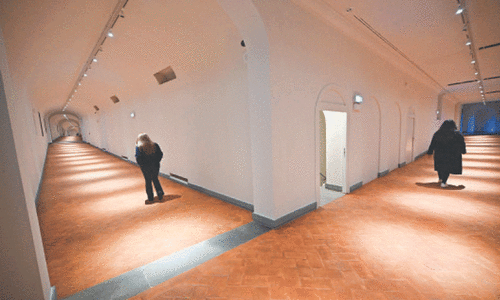• Israel on high alert anticipating major military action from Hezbollah
• Two people killed in a stabbing attack near the commercial hub of Tel Aviv
BEIRUT: Urgent calls for foreign nationals to leave Lebanon grew on Sunday with France warning of “a highly volatile” situation as Iran and its allies ready their response to high-profile killings blamed on Israel.
Hezbollah movement, which has traded near-daily fire with Israeli forces since the Gaza conflict broke out in October, announced its fighters had fired a new barrage of rockets at Israel’s north overnight into Sunday.
The Israeli military said 30 projectiles were launched from Lebanon, with most of them intercepted.
With Israel on high alert anticipating major military action from Hezbollah and others, Israeli Defence Minister Yoav Gallant said: “If they dare to attack us, they will pay a heavy price.” Near the commercial hub of Tel Aviv, medics and police said two people were killed on Sunday in a stabbing attack.
The assailant, a Palestinian from the Israeli-occupied West Bank, was “neutralised” by police and taken to hospital, where he was pronounced dead.
Saud Arabia joined France, Canada and Jordan in calling on their citizens to leave Lebanon.
“In a highly volatile security context”, French nationals were “urgently asked” to avoid travelling to Lebanon, and those already in the country should leave “as soon as possible”, the foreign ministry in Paris said. The United States and Britain have issued similar warnings.
France on Sunday also urged its nationals living in Iran to “temporarily leave”, warning Iranian airspace and airports could close. Several Western airlines have suspended flights to Lebanon and other airports in the region.
On Sunday Qatar Airways said the Doha-Beirut route would “operate exclusively during daylight hours” at least until Monday.
Wednesday’s assassination of Hamas political leader Ismail Haniyeh in Tehran, hours after the Israeli killing of Hezbollah’s military chief in Beirut, has triggered vows of vengeance from Iran and the “axis of resistance” of Tehran-backed armed groups. Haniyeh was Hamas’s lead negotiator in efforts to end the war. His killing raised questions about the continued viability of efforts by Qatari, Egyptian and US mediators to broker a truce and exchange prisoners.
War ‘without constraints’
Analysts have told this news agency that a joint but measured action from Iran and its allies was likely, while Tehran said it expects Hezbollah to hit deeper inside Israel and no longer be confined to military targets.
Israel’s ally the United States said it would move warships and fighter jets to the region.
US President Joe Biden, asked by reporters if he thought Iran would stand down, said: “I hope so. I don’t know.” In an interview with ABC News, White House deputy national security adviser Jon Finer said the United States was “doing everything possible to make sure that this situation does not boil over”.
Published in Dawn, August 5th, 2024















































Dear visitor, the comments section is undergoing an overhaul and will return soon.